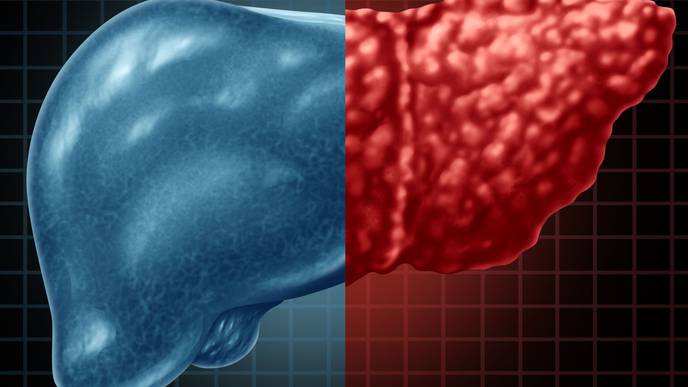Immunologists Uncover Obesity-Linked Trigger to Severe Form of Liver Disease

01/05/2023
UT Southwestern immunologists have uncovered a key pathogenic event prompted by obesity that can trigger severe forms of nonalcoholic fatty liver disease and potential liver failure. The finding, published in Immunity, could pave the way for developing therapies to treat nonalcoholic steatohepatitis (NASH).
The team led by Zhenyu Zhong, Ph.D., and Shuang Liang, Ph.D., Assistant Professors of Immunology, revealed that persistent obesity can damage a macrophage receptor, called TREM2, thereby disabling a critical function that otherwise keeps liver inflammation in check. The imbalance then fuels chronic liver inflammation to enable NASH development.
NASH is an aggressive form of nonalcoholic fatty liver disease (NAFLD)—a spectrum of chronic liver disorders that start out as benign fatty liver but can progress into more advanced disease stages including NASH, cirrhosis and even hepatocellular carcinoma (HCC), the dominant form of primary liver cancer. The underlying molecular mechanisms that cause fatty liver disease to progress to NASH and beyond have eluded researchers, creating significant hurdles to developing effective therapies.
Bridging this knowledge gap, Drs. Zhong and Liang discovered that dietary obesity upregulates TREM2 expression in the liver-infiltrating macrophages—a critical population of immune cells responsible for removing lipid-damaged hepatocytes.
"The clearance of these damaged cells by macrophages (a process also referred to as efferocytosis) is key to maintaining liver immune silence in the fatty liver to prevent chronic inflammation and NASH," Dr. Liang said.
Upon examination of TREM2 expression during NASH development, the researchers unexpectedly found that persistent obesity significantly impaired macrophage-dependent removal of lipid-damaged hepatocytes by inducing TREM2 cleavage and inactivation.
"We discovered that two proinflammatory cytokines, TNF and IL-1β, activate a proteinase named ADAM17 in macrophages that in turn cleaves and inactivates TREM2. This leads to aberrant accumulation of lipid-loaded, dying hepatocytes in the liver where they cause chronic liver inflammation and subsequent NASH development," said Dr. Zhong, a member of the Harold C. Simmons Comprehensive Cancer Center and a Cancer Prevention and Research Institute of Texas Scholar in Cancer Research at UT Southwestern. "We reason that blocking TREM2 cleavage to restore the macrophage's ability to remove lipid-damaged hepatocytes has the great potential to treat NASH."
Additionally, they discovered that the cleaved product, the soluble TREM2 (sTREM2), whose abundance is drastically elevated in the circulation of NASH-bearing mice and patients, can serve as a noninvasive biomarker for NASH.
The Zhong Lab is focused on understanding the fundamental molecular mechanisms by which chronic liver inflammation is established. "With the unprecedented obesity epidemic, NASH has become a major chronic liver disorder, affecting approximately 3%-5% of the global population," said Dr. Zhong, a member of the Division of Basic Science of UT Southwestern's Graduate School of Biomedical Sciences.
"By deploying a combination of biochemical, genetic, molecular, immunological, imaging, and histochemical tools as well as single-cell 'omics' analyses, our ultimate goal is to reveal the fundamental molecular mechanisms underlying chronic liver inflammation and explore if such novel mechanistic insights could be applied to benefit liver repair and regeneration after injury, thereby preventing NAFLD progression into NASH and HCC."
Xiaochen Wang et al, Prolonged hypernutrition impairs TREM2-dependent efferocytosis to license chronic liver inflammation and NASH development,
Immunity(2022).
DOI: 10.1016/j.immuni.2022.11.013Citation: Immunologists uncover obesity-linked trigger to severe form of liver disease (2022, December 27) retrieved 27 December 2022 from https://medicalxpress.com/news/2022-12-immunologists-uncover-obesity-linked-trigger-severe.html
This document is subject to copyright. Apart from any fair dealing for the purpose of private study or research, no part may be reproduced without the written permission. The content is provided for information purposes only.

Facebook Comments